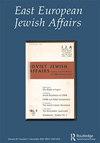US Cold War Immigration Policy, Human Rights, and the Soviet Jewry Movement: Reflections on William Korey’s “The Right to Leave for Soviet Jews – Legal and Moral Aspects.”
IF 0.2
4区 哲学
Q2 HISTORY
引用次数: 0
Abstract
Is immigration – the right to leave one’s place of birth and find refuge in another nation – a basic human right? Indeed, the United States government has told thousands of Central Americans since 2017 that it will refuse to recognize their right to claim asylum at the United States border despite this being, considered by international law a basic human right. The US government under Donald Trump also embraced a policy of family separation in which children were ripped from their parents, some never to be returned. As the United States rejects its commitment to protecting human rights and challenges the broader international system of asylum, it is interesting to reflect back on the work William Korey penned fifty years ago for this journal. Korey sought through his activism and writing to make the plight of Soviet Jewry central to the Cold War. By establishing in “The Right to Leave for Soviet Jews – Legal and Moral Aspects” that “Soviet Jewry’s right to emigration was a basic human right,” he enlisted the United States in powerful ways to fight the Jewish community’s war against the Soviet Union’s treatment of its Jews. Indeed, reading this article fifty years after it was penned demonstrates not only the many inconsistencies in United States policy, which had long denied other groups fleeing persecution and Communism entry into the United States. It shows how the work and writings of American Jewish activists like Korey through publications like this, Korey helped make the fight to “free Soviet Jewry” central to the United States arsenal in the Cold War by linking human rights and open immigration as key weapons that could defeat the Soviet Union. In general, the embrace of human rights in US immigration policy was never a US imperative; indeed, Korey’s other life project – getting the United States government to sign the United Nation’s Universal Declaration of Human Rights – suggests one should question the United States broader commitment to human rights. Rereading this piece lays bare not only Korey’s astute insight about how to coopt American power for Jewish interests. He appreciated that “US Immigration policy has always intersected with more global concerns about the status, extension, and maintenance of the United States power in the world,” to use the words of historian Paul Kramer. The success in Korey’s emphatic call “ to establish Soviet Jewry’s right to emigration as a basic human right, which the United States should fight for in the international arena,” illustrates how he understood that during the Cold War “immigration policy was an instrument of United States’ global power.” Indeed, from the vantage point of 2020, we see clearly that basic美国冷战时期的移民政策、人权和苏联犹太人运动:对威廉·科瑞的《苏联犹太人离开的权利——法律和道德方面》的反思。
移民——离开出生地并在另一个国家避难的权利——是一项基本人权吗?事实上,自2017年以来,美国政府已经告诉数千名中美洲人,它将拒绝承认他们在美国边境申请庇护的权利,尽管国际法认为这是一项基本人权。唐纳德·特朗普领导下的美国政府也接受了一项家庭分离政策,在这项政策中,孩子们被从父母身边夺走,有些孩子再也回不来了。在美国拒绝其保护人权的承诺并挑战更广泛的国际庇护制度之际,回顾威廉·科里50年前为本杂志撰写的作品是很有趣的。Korey试图通过他的激进主义和写作,使苏联犹太人的困境成为冷战的核心。通过在《苏联犹太人的离开权——法律和道德方面》中确立“苏联犹太人的移民权是一项基本人权”,他以强有力的方式动员美国对抗犹太社区反对苏联对待犹太人的战争。事实上,在这篇文章发表50年后阅读这篇文章,不仅表明了美国政策中的许多不一致之处,长期以来,美国一直拒绝其他逃离迫害和共产主义的团体进入美国。它展示了像Korey这样的美国犹太活动家的工作和著作是如何通过这样的出版物,Korey通过将人权和开放移民作为可能击败苏联的关键武器,帮助美国在冷战期间将“解放苏联犹太人”的斗争作为美国武器库的核心。总的来说,在美国移民政策中拥抱人权从来都不是美国的当务之急;事实上,Korey的另一个生活项目——让美国政府签署联合国的《世界人权宣言》——表明人们应该质疑美国对人权的更广泛承诺。重读这篇文章不仅揭示了科里对如何为了犹太人的利益而利用美国力量的敏锐见解。用历史学家保罗·克莱默的话来说,他很欣赏“美国的移民政策总是与全球对美国在世界上的地位、扩张和维持的更多担忧交织在一起”。Korey强烈呼吁“将苏联犹太人的移民权确立为一项基本人权,美国应该在国际舞台上为之奋斗”,这一呼吁的成功表明了他是如何理解冷战期间“移民政策是美国全球力量的工具”的
本文章由计算机程序翻译,如有差异,请以英文原文为准。
求助全文
约1分钟内获得全文
求助全文

 求助内容:
求助内容: 应助结果提醒方式:
应助结果提醒方式:


